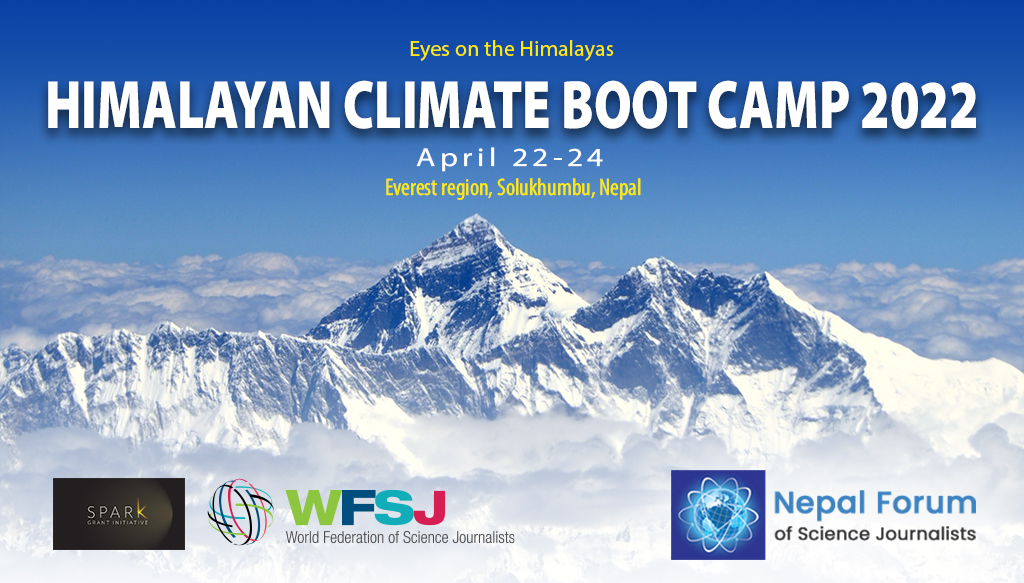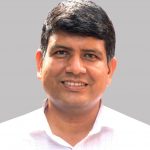
 Chhatra Karki has spent more than two decades as a science journalist and in 2014 became the Founding President of the Nepal Forum of Science Journalists, a WFSJ member association. Earlier this year he received one of the first awards made through the Spark Grant Initiative, a funding program created by five science journalism organizations in the US and Europe and administered by the WFSJ. Karki is using this support to mount a training opportunity for science writers across south Asia to learn more about how best to cover the daunting subject of climate change. For more information about this training opportunity, visit this NSFJ Web site page.
Chhatra Karki has spent more than two decades as a science journalist and in 2014 became the Founding President of the Nepal Forum of Science Journalists, a WFSJ member association. Earlier this year he received one of the first awards made through the Spark Grant Initiative, a funding program created by five science journalism organizations in the US and Europe and administered by the WFSJ. Karki is using this support to mount a training opportunity for science writers across south Asia to learn more about how best to cover the daunting subject of climate change. For more information about this training opportunity, visit this NSFJ Web site page.
What prompted your interest in climate change?
In 2007, I had visited a natural disaster-prone impoverished village in southern plain of Nepal with a team of climate researchers. They were trying to understand the phenomena of climatic extremities, its impacts and vulnerabilities, and find the solutions. Local communities had been suffering from climate-related disasters for years. The science was there, solutions were out there, but the local people did not understand the complex science of weather and climate change, nor could the scientists communicate these issues in lay terms.
As a journalist, this incident touched me. I realized that this communication barrier between scientists and public is a tremendous opportunity for journalists like me. In my understanding, science reporting in public media can bridge the gap among science, society and policy. It can alert the public, inform policy, and provide feedback to the scientific community.
How did you arrive at the Boot Camp concept?
A few years back, I attended a South Asian media briefing on climate change organized by the Center for Science and Environment (CSE) in New Delhi, India. Participants there took a keen interest as I shared my observations and insights on glaciers melting in the Himalayan region. However, it was not based on my first-hand account but instead on secondary sources.
At that moment, a preliminary idea came into my mind that an event like a boot camp workshop would be beneficial for science journalists in the Himalayan region. They would get a first-hand experience of the ground realities of climate-affected regions and also be able to discuss the nuances of climate science as it relates to journalism. That dream of a few years ago has now come true.
Before preparing the Boot Camp Proposal for the Spark Grant Initiative, I consulted with climate scientists, researchers, academicians, and science journalists, who helped a lot to shape my application in right way. I further sharpened this idea through various scientific articles on the Himalayas and climate change. And now I am happy that this proposal has been selected for the Spark Grant.
What do you hope to achieve with the Boot Camp? And what comes next?
This project aims to gather eight science journalists from Nepal, India and Bangladesh in a single venue. The Boot Camp is going to be held in the foothills of Mt. Everest and to the best of my knowledge, no such climate journalism event has ever been held in this region. Similarly, the project will adopt a novel approach to achieve its intended objectives. The focus will be on personal reflections and observations as well as the group dynamics to generate wider impact.
A separate day will be allocated within the Boot Camp workshop, where the participating journalists will engage in focus group discussions and key interviews with members of the local community, so that we can try to understand facets of climate change that have gathered limited media attention so far. These insights could range from aspects of building resilience in the community to the overarching problems of mitigation and adaptation.
Since the emphasis will be on experiential learning and critical thinking, science journalists grappling with the challenges of producing impactful climate stories will benefit hugely from this project. In addition, the project is intended to give media reporting on climate topics a higher profile with concerned stakeholders, such as governments, NGO/INGOs, media, and academia.
After the boot camp, we want to disseminate climate news, articles and commentaries based on in-depth field reporting in the Himalayan region. This could provide a better insight for the policymakers to formulate evidence based climate policies.